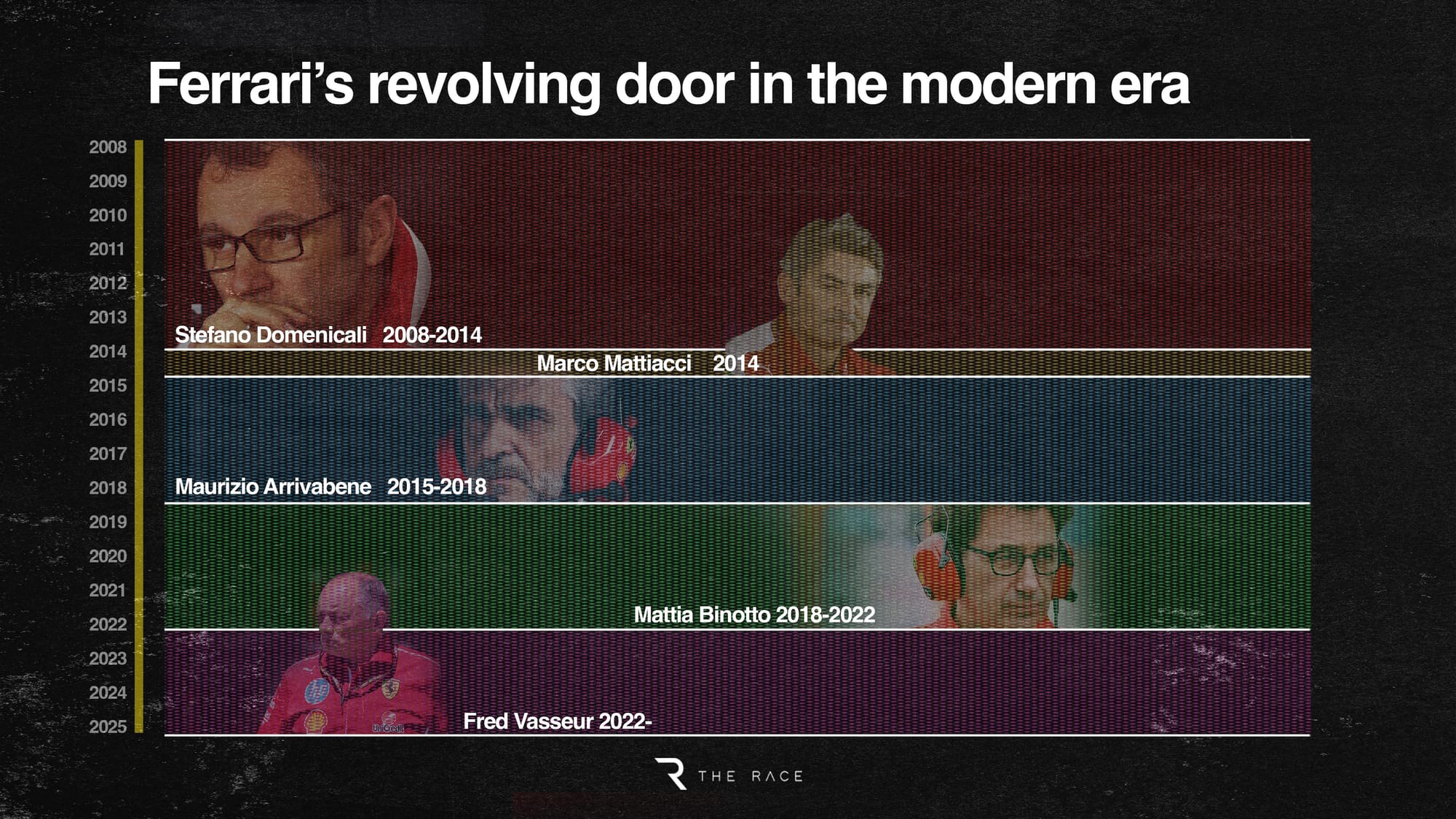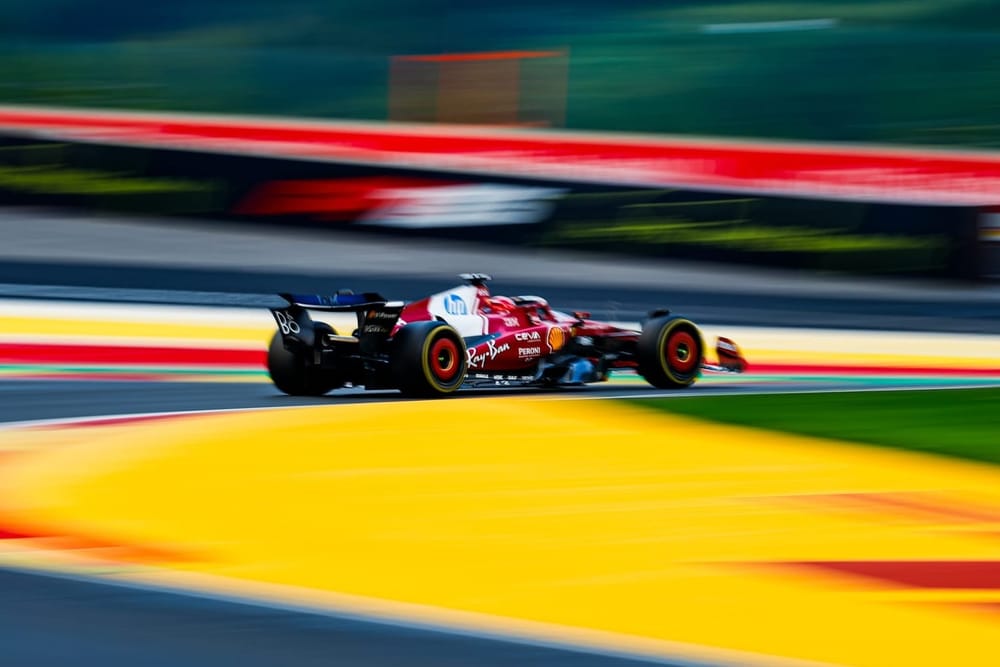Fred Vasseur’s multi-year renewal as Ferrari’s Formula 1 boss has come as a surprise ahead of the Hungarian Grand Prix.
Vasseur, whose original Ferrari contract was due to end this year, has come under immense pressure at times from factions of the Italian media in 2025 with strong suggestions that Ferrari management were considering a change of team principal.
On the Thursday of F1’s final race before the summer break, though, came an unexpected announcement that Ferrari and Vasseur had agreed a new multi-year deal.
So what has convinced Ferrari that Vasseur’s the man for the job - and why has it been announced now?
True support when it counted
Vasseur had to ride out an aggressive storm in June, when major Italian newspapers all ran stories at the same time ahead of the Canadian GP suggesting Ferrari was seriously considering replacing him.
The indication was that the notion had been discussed to some degree at a recent board meeting, which was latched onto especially by Vasseur critics.
Vasseur has been under the magnifying glass a lot since taking charge of Ferrari at the start of 2023, even by the standards of F1’s most scrutinised team. As its first non-Italian boss in almost 20 years, and with a very different way of working, he was an easy target for loyalists of the previous Mattia Binotto regime and skeptics of an ‘outsider’ taking charge.
But Vasseur has always shrugged off such attention fairly easily, and navigated the pressure better than most. June’s attack was not followed up with an evocative statement of support - but votes of confidence at Ferrari haven’t meant much over the years, and it seems Vasseur got what really matters, which is real backing behind the scenes.
Normally, the second a Ferrari boss is in the crosshairs, their days are numbered. It usually reflects serious consideration at top level, or perhaps even that the decision has been made. But the fact Vasseur has come out the other side not only in the job but with a new contract means Ferrari gave its true support when it counted.
Ferrari has been better
There’s no doubt that Ferrari has become a tighter ship during Vasseur’s two-and-a-half years at the helm. While there remains room for improvement, the team is more convincing in terms of trackside execution, strategy and car development.
Those gains almost yielded a first world title since 2008 last year, with Ferrari only finishing 14 points behind McLaren in the constructors’ championship. While this year has been winless despite justified expectations of a push for both crowns, so far it could just be a bump in the road in what has generally been a positive trajectory.
Vasseur has brought a sense of calm and method to the team, keeping the political waters relatively smooth and ensuring everyone knows exactly what their objectives and priorities are. That means that despite the current dip, he has also introduced the correct methodology to recover.
“Fred is a guy that has a very big strength of keeping the emotional level of the team at a very good level,” said Charles Leclerc at the launch of the 2025 Ferrari. “We've been so much more solid on that.”
Ferrari is always subject to intense scrutiny and criticism, and while there have been weekends where strategy and communications have legitimately been questioned this year it’s still a significant improvement from the pre-Vasseur era.
There’s more work to be done, but the gains made under Vasseur so far are proof that there will be more to come. And who better to ensure there is the right, calm, methodical reaction to Ferrari’s current struggles than Vasseur?
The foundations we can't see
F1 teams can be a little bit like oil tankers; it takes an awful long time for a change of direction to take place.
Vasseur knew very early on within his tenure at Maranello that turning the team into his vision was never going to be something that happened overnight.
The perfect example of that was in revamping his technical organisation and bringing in Loic Serra from Mercedes.
A deal was agreed in the summer of 2023, it wasn’t announced until spring last year, and Serra only joined in October 2024 - with his impact only really going to be felt on the 2026 car.
The Serra situation is symptomatic of the way that change within an F1 organisation has to be judged over the long haul; the importance comes from laying down foundations and it can take many years for this to happen.
The building phase has been the focus of Vasseur’s work; and is something that is perhaps only seen and appreciated right now behind the scenes rather than out on track.
Only once the foundations are in place, can something better be constructed on top of it - and in F1 that manifests itself as success on track.
2026 is significant point of judgement
Next year’s rules overhaul is a huge moment for every team and will likely define everybody’s competitive prospects until the end of the decade.
And the “foundations” that Ferrari has stressed in announcing Vasseur’s new deal are all about the next rules cycle, because 2026 could be considered the first real Vasseur-era Ferrari.
He is always the first to point out that the job is never finished and constant progress is essential, but remoulding Ferrari is a slow process. Compare it to how Andrea Stella reshaped key aspects of McLaren so quickly, and the rapid ascent that sparked, and you get an idea of how laboured the Ferrari machine is compared to some of its rivals.
Perhaps Vasseur could have moved quicker in some areas, but to take the above oil tanker analogy further - others can feel like speedboats compared to Ferrari.
Vasseur agrees with the notion that in 2026, ‘his’ Ferrari should have come together in time to work much more in the way he intends.
As a complete car and engine overhaul it is there a significant point of reference for its progress under his leadership - and therefore makes sense to keep him at the helm through the transition.
Leclerc and Hamilton still believe
When reports first emerged about the possibility of Vasseur being ousted, Lewis Hamilton and Charles Leclerc made it emphatically clear they still backed him.
Hamilton remains determined to turn things round after a troubled start to his Ferrari career and sees Vasseur as central to the team’s plans to return to the top in F1.
“I love working with Fred,” said Hamilton in Montreal. “He’s the main reason I’m in this team and I’m forever grateful for it. We’re in this together. Things aren’t perfect. I’m here to work with the team, but also with Fred. I want Fred here. I believe Fred is the person to take us to the top.”
While Leclerc has been critical of the car problems during the first half of the year, with the same Italian media reports that questioned Vasseur’s future also suggesting he had lost confidence according to word from his “closest circle”, he has long been a staunch supporter of Vasseur. What’s more, he was content with the step made thanks to upgrades at the Belgian GP.
“We’ve had what we expected with this upgrade and that's really positive,” he said after finishing third at Spa. “We need to keep learning about how to maximise this upgrade. It's still pretty new, but it's a good first weekend and I'm happy that we are on the podium to thank the whole team back in Maranello.”
Such is their confidence in Vasseur, it’s doubtful whether any replacement would have had anything like the same support from the drivers.
He's probably the best fit
There has been a lot of talk in recent weeks, especially in the wake of Christian Horner’s dismissal from Red Bull, about team bosses in F1 becoming as expendable as football managers.
But to treat them like that is to fundamentally not understand the challenge and scope of the job a team boss must do, because they are more than just about managing a team out on track. They need to be leaders; they need to establish the culture and they need to get all the elements of their squad working together.
Ferrari has been through too many team bosses in recent years. While Horner led Red Bull over 20 years to win 124 races and 14 titles in total, Ferrari cycled through six bosses - Jean Todt, Stefano Domenicali, Marco Mattiacci, Maurizio Arrivabene, Mattia Binotto and current incumbent Vasseur - for 65 wins and just three crowns.

Going for a seventh team principal would have been an acceptance of failure and simply put the team back to square one; as whoever the replacement was would have wanted to do things their own way.
Sure, Horner was available right now, and we know chairman John Elkann tried to lure him back in the summer of 2022, but Ferrari really needed to have conviction that its current trajectory is right - and accept that it takes time in F1 for things to be pulled together and work.
In Vasseur, it has been through the early phase of a new way forward where progress does not appear rapid. But as the Stella era at McLaren has shown, once things click then results can come quickly.



